king george iii
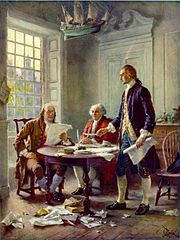
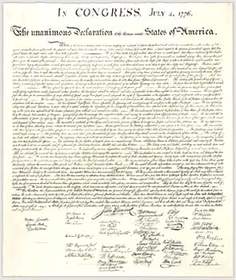 While Independence Day is celebrated on July 4th each year, with all the festivities, days off, barbecues, and fireworks, our nation…formally known as the thirteen colonies, actually obtained legal separation from Great Britain on July 2, 1776, when the Second Continental Congress voted to approve a resolution of independence that had been proposed in June by Richard Henry Lee of Virginia declaring the United States independent from Great Britain’s rule. Called the Lee Resolution, it was also known as “The Resolution for Independence” and was the formal assertion passed by the Second Continental Congress on July 2nd. The Lee Resolution resolved that the Thirteen Colonies, at the time referred to as the United Colonies, were “free and independent states” and were now separate from the British Empire. The resolution created what became the United States of America.
While Independence Day is celebrated on July 4th each year, with all the festivities, days off, barbecues, and fireworks, our nation…formally known as the thirteen colonies, actually obtained legal separation from Great Britain on July 2, 1776, when the Second Continental Congress voted to approve a resolution of independence that had been proposed in June by Richard Henry Lee of Virginia declaring the United States independent from Great Britain’s rule. Called the Lee Resolution, it was also known as “The Resolution for Independence” and was the formal assertion passed by the Second Continental Congress on July 2nd. The Lee Resolution resolved that the Thirteen Colonies, at the time referred to as the United Colonies, were “free and independent states” and were now separate from the British Empire. The resolution created what became the United States of America.
After passing the vote for independence, Congress could turn its attention to the Declaration of Independence, which would be the official statement explaining this decision. The Declaration of Independence had been prepared by a Committee of Five, with Thomas Jefferson as its principal author. While Jefferson collaborated extensively with the other four members of the Committee of Five, i,t was largely his writing and his wording that made up the Declaration of Independence. It was composed in isolation over 17 days between June 11, 1776, and June 28, 1776. Jefferson was renting the second floor of a three-story private home at 700 Market Street in Philadelphia at the time. The house, within walking distance of Independence Hall, is now known as the Declaration House.
Of course, as with any document brought before Congress, they debated and revised the wording of the Declaration, and for reasons unknown, removed wording in which Jefferson had vigorously denounced King George III for importing the slave trade. They finally approved the document two days later on July 4th. John 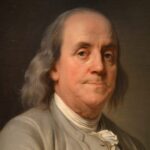
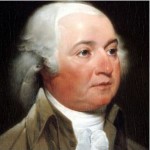
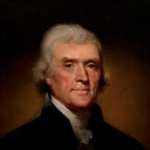 Adams wrote a letter to his wife, Abigail, on July 3rd, stating, “The second day of July 1776, will be the most memorable epoch in the history of America. I am apt to believe that it will be celebrated by succeeding generations as the great anniversary festival. It ought to be commemorated as the day of deliverance, by solemn acts of devotion to God Almighty. It ought to be solemnized with pomp and parade, with shows, games, sports, guns, bells, bonfires, and illuminations, from one end of this continent to the other, from this time forward forever more.”
Adams wrote a letter to his wife, Abigail, on July 3rd, stating, “The second day of July 1776, will be the most memorable epoch in the history of America. I am apt to believe that it will be celebrated by succeeding generations as the great anniversary festival. It ought to be commemorated as the day of deliverance, by solemn acts of devotion to God Almighty. It ought to be solemnized with pomp and parade, with shows, games, sports, guns, bells, bonfires, and illuminations, from one end of this continent to the other, from this time forward forever more.”
Of course, as we all know, Adams’s prediction was off by two days. Nevertheless, his idea that a day should be celebrated forever, did become a tradition, not on July 2nd, but rather on July 4th, because of the Declaration of Independence. That was because of the date shown on the much-publicized Declaration of Independence, rather than the date the resolution of independence was approved in a closed session of Congress. In addition, historians have disputed whether members of Congress signed the Declaration of Independence on July 4th, even though Thomas Jefferson, John Adams, and Benjamin Franklin all later wrote that they had signed it on that day. Many historians believe that the Declaration was signed nearly a month after its adoption, on August 2, 1776, and not on July 4th as many have believed. Nevertheless, they have been unable to prove their theory or to change the date on which we celebrate our independence.
One thing that I find very interesting is the fact that both Thomas Jefferson and John Adams, who were the only two signatories of the Declaration of Independence later to serve as presidents of the United States, both 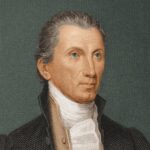
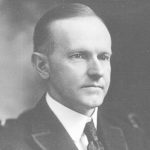 died on the same day…July 4, 1826, and within five hours of each other. They were also the last surviving members of the original American revolutionaries. It was also the 50th anniversary of the Declaration of Independence. James Monroe, while not a signatory of the Declaration of Independence, but who was another Founding Father who was elected president, also died on July 4, 1831, making him the third President who died on the anniversary of independence. There was one president who was born on Independence Day…Calvin Coolidge, who was born on July 4, 1872.
died on the same day…July 4, 1826, and within five hours of each other. They were also the last surviving members of the original American revolutionaries. It was also the 50th anniversary of the Declaration of Independence. James Monroe, while not a signatory of the Declaration of Independence, but who was another Founding Father who was elected president, also died on July 4, 1831, making him the third President who died on the anniversary of independence. There was one president who was born on Independence Day…Calvin Coolidge, who was born on July 4, 1872.
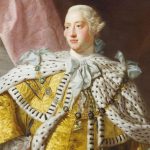 If King George III was hoping to keep the New England colonies dependent on the British by placing taxes, restrictions, lockdowns, and the New England Restraining Act on them, he greatly underestimated the colonists. The New England Restraining Act was endorsed by King George III on March 30, 1775. The Act required New England colonies to trade exclusively with Great Britain as of July 1, 1775, with an additional rule going into effect on July 20, banning colonists from fishing in the North Atlantic.
If King George III was hoping to keep the New England colonies dependent on the British by placing taxes, restrictions, lockdowns, and the New England Restraining Act on them, he greatly underestimated the colonists. The New England Restraining Act was endorsed by King George III on March 30, 1775. The Act required New England colonies to trade exclusively with Great Britain as of July 1, 1775, with an additional rule going into effect on July 20, banning colonists from fishing in the North Atlantic.
The Restraining Act and the Conciliatory Proposition were introduced to Parliament by British prime minister, Frederick, Lord North, on the same day. The Conciliatory Proposition promised that no colony that met its share of imperial defenses and paid royal officials’ salaries of their own accord would be taxed…a ridiculous statement, because the very act of making the forced payments was basically taxing. Supposedly, the British were 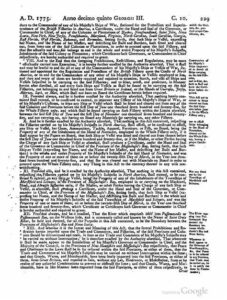 conceding to the colonists’ demand that they be “allowed to provide the crown with needed funds on a voluntary basis.” Through the preposition, Parliament would ask for money through requisitions, not demand it through taxes. If you ask me, that is a distinction without a difference. Either way, the colonists were forced to pay for things they shouldn’t have to. The Restraining Act was meant to appease Parliamentary hardliners, who would otherwise have impeded passage of the pacifying proposition. So, Lord North had to work both sides against the middle to get the Conciliatory Proposition passed.
conceding to the colonists’ demand that they be “allowed to provide the crown with needed funds on a voluntary basis.” Through the preposition, Parliament would ask for money through requisitions, not demand it through taxes. If you ask me, that is a distinction without a difference. Either way, the colonists were forced to pay for things they shouldn’t have to. The Restraining Act was meant to appease Parliamentary hardliners, who would otherwise have impeded passage of the pacifying proposition. So, Lord North had to work both sides against the middle to get the Conciliatory Proposition passed.
Unfortunately for North and prospects for peace, General Thomas Gage had already received orders from London to march on Concord, Massachusetts. His orders were to destroy the armaments stockpiled in the town and take Patriot leaders John Hancock and Samuel Adams into custody. Gage had received the orders in January 1775 and arrived in Boston before the Conciliatory Proposition, meaning that he didn’t know about the 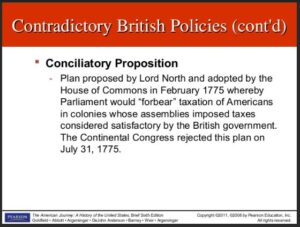 agreement made to stop the taxing of the colonists. So, on April 18, 1775, an army of 700 Redcoats marched towards Concord Bridge. It was basically the last straw…the military action that would lead to the Revolutionary War, the birth of the United States as a new nation, the temporary downfall of Lord North, and the near abdication of King George III. The Treaty of Paris marked the end of the conflict and guaranteed New Englanders the right to fish off Newfoundland. It was the very right denied them by the New England Restraining Act. The British learned that they could only push the colonists so far, and then they would lose control of the very people they tried to enslave.
agreement made to stop the taxing of the colonists. So, on April 18, 1775, an army of 700 Redcoats marched towards Concord Bridge. It was basically the last straw…the military action that would lead to the Revolutionary War, the birth of the United States as a new nation, the temporary downfall of Lord North, and the near abdication of King George III. The Treaty of Paris marked the end of the conflict and guaranteed New Englanders the right to fish off Newfoundland. It was the very right denied them by the New England Restraining Act. The British learned that they could only push the colonists so far, and then they would lose control of the very people they tried to enslave.
 The American Revolution was a serious embarrassment to Britain, and especially to King George III. The king had to admit that things weren’t going well in the colonies…at least not where Britain was concerned. By now, the colonists had signed the Declaration of Independence that summer, and they were not going to be moved from achieving their goal to be a sovereign nation.
The American Revolution was a serious embarrassment to Britain, and especially to King George III. The king had to admit that things weren’t going well in the colonies…at least not where Britain was concerned. By now, the colonists had signed the Declaration of Independence that summer, and they were not going to be moved from achieving their goal to be a sovereign nation.
On this day, October 31, 1776, the king give a speech to the British Parliament, telling them about the signing of the United States Declaration of Independence and the revolutionary leaders who signed it, saying, “for daring and desperate is the spirit of those leaders, whose object has always been dominion and power, that they have now openly renounced all allegiance to the crown, and all political connection with this country.” I’m sure he felt that the colonists were rebels, who were not worth wasting time on by now, and he 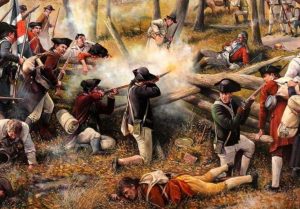 hoped he could walk away from them without losing face any more than he already had. The British never intended for the United States to be anything more than the colones. The king went on to inform Parliament of the successful British victory over General George Washington and the Continental Army at the Battle of Long Island on August 27, 1776, but warned them that, “notwithstanding the fair prospect, it was necessary to prepare for another campaign.” Somehow, the king had the idea that there was still hope to keep the colonies.
hoped he could walk away from them without losing face any more than he already had. The British never intended for the United States to be anything more than the colones. The king went on to inform Parliament of the successful British victory over General George Washington and the Continental Army at the Battle of Long Island on August 27, 1776, but warned them that, “notwithstanding the fair prospect, it was necessary to prepare for another campaign.” Somehow, the king had the idea that there was still hope to keep the colonies.
Despite George III’s harsh words, General William Howe and his brother, Admiral Richard Howe, still hoped to convince the Americans to rejoin the British empire in the wake of the colonists’ humiliating defeat at the Battle of Long Island. They hoped to do  thing peacefully, but that was just not to be. The British could easily have prevented Washington’s retreat from Long Island and captured most of the Patriot officer corps, including the commander in chief. However, instead of forcing the former colonies into submission by executing Washington and his officers as traitors, the Howe brothers let them go with the hope of swaying Patriot opinion towards a return to the mother country. The Howe brothers’ attempts at negotiation failed, and the War for Independence dragged on for another four years, until the formal surrender of the British to the Americans on October 19, 1781, after the Battle of Yorktown. The freedom of the United States was not going to be taken from them…and that was a serious embarrassment to Britain.
thing peacefully, but that was just not to be. The British could easily have prevented Washington’s retreat from Long Island and captured most of the Patriot officer corps, including the commander in chief. However, instead of forcing the former colonies into submission by executing Washington and his officers as traitors, the Howe brothers let them go with the hope of swaying Patriot opinion towards a return to the mother country. The Howe brothers’ attempts at negotiation failed, and the War for Independence dragged on for another four years, until the formal surrender of the British to the Americans on October 19, 1781, after the Battle of Yorktown. The freedom of the United States was not going to be taken from them…and that was a serious embarrassment to Britain.

